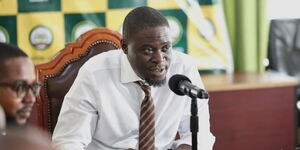Members of Parliament on Tuesday attempted to save the once-vibrant academic giant, the University of Nairobi. The university has been faced with challenges, among them leadership wrangles and financial mismanagement claims.
In a bid to weigh in on the problems facing the varsity, the MPs from the Education Committee summoned the institution's acting Vice-Chancellor, Professor Margaret Hutchinson, who had a tough time before the lawmakers as she faced their questions.
The lawmakers demanded to know the legality of certain administrative positions and the prolonged vacancies in senior roles within the institution.
The committee members demanded clarity on how the university was addressing governance challenges, including unapproved management positions, Ksh13.6 billion in pending bills, and the prolonged appointment of key officials in an acting capacity.
Lugari MP Nabii Nabwera pressed the VC to explain how offices were created within the institution for employees outside the legal framework.
"This university operates under a legal framework. Is it right to be referring to offices that were created outside of this legal framework?" asked Nabwera.
Hutchinson explained that the university’s statutes were last updated in 2013, but administrative reforms were initiated in 2020, leading to the creation of new positions, including the Chief Operating Officer.
However, the committee questioned the legitimacy of these positions, with Eve Obara asking for documentation justifying the structural changes.
"A review was done, new positions were created, and you determined they were not working and reverted to the previous structure. Where are the documents to justify this?" she inquired.
Committee members also raised concerns over governance and questioned the long-standing issue of staff serving in acting capacities.
"How is the university addressing the many cases of staff in acting capacity, stagnation, and the creation of offices not aligned with the statutes?" asked Rebecca Tonkei, a committee member.
In her defence, the VC admitted that for over five years, many senior positions had been held in an acting capacity, leading to leadership instability and inconsistencies in strategy implementation.
The Vice-Chancellor added that the Public Service Commission (PSC) had conducted interviews for the vacant positions of Deputy Vice-Chancellor (Academic Affairs) and Vice-Chancellor and that the university was awaiting the results.
The committee also raised concerns about the university's financial health, pointing out that despite receiving salaries directly from the Exchequer through negotiations with the Universities Academic Staff Union (UASU), the institution was still struggling with massive debts.
To address the challenges, Hutchinson outlined several strategies, including prioritising fiscal discipline, engaging the government for additional funding, strengthening alumni contributions, and increasing research collaborations.












